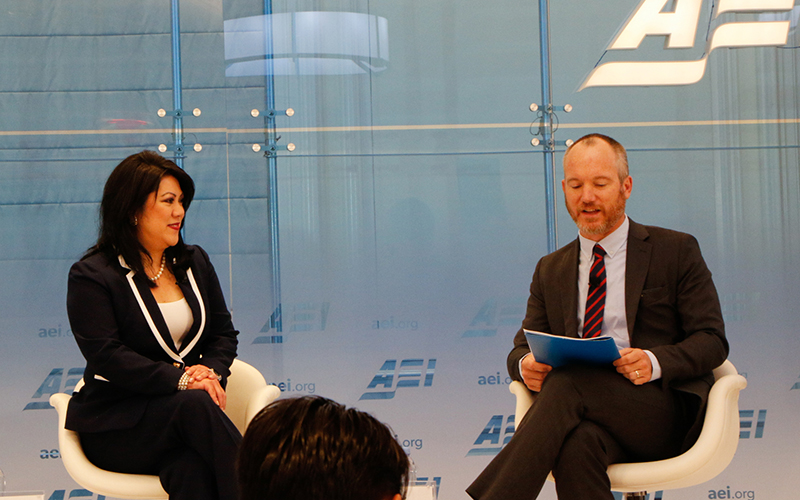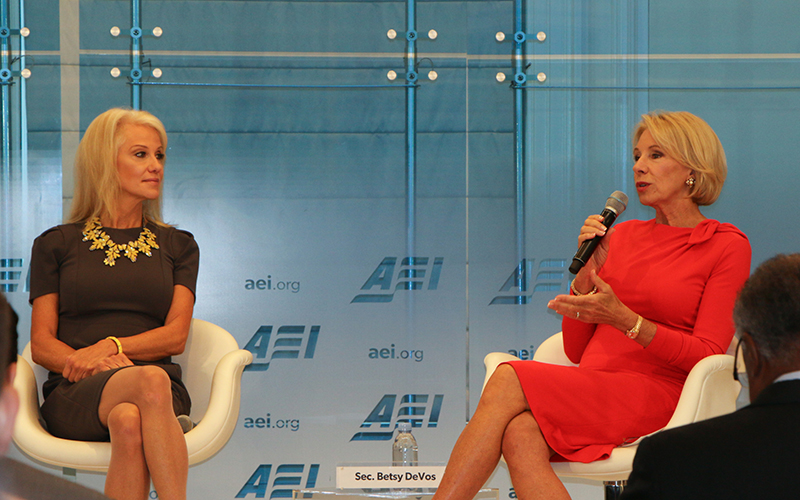
Arizona Treasurer Kimberly Yee talks about the state’s Empowerment Scholarship Account program with the American Enterprise Institute’s Nat Malkus at an AEI event about a federal school choice plan. (Photo by Amy-Xiaoshi DePaola/Cronkite News)

White House senior adviser Kellyanne Conway, left, and Education Secretary Betsy Devos talk about the administration’s Education Freedom Scholarships, a proposed $5 billion school choice plan. (Photo by Amy-Xiaoshi DePaola/Cronkite News)
WASHINGTON – Arizona has long been at the forefront of the school voucher and school choice movement, but State Treasurer Kimberly Yee told a Washington audience Tuesday that more needs to be done.
Yee was among officials from several states who joined Education Secretary Betsy DeVos and White House Senior Counselor Kellyanne Conway to promote the administration’s $5 billion Education Freedom Scholarship program.
The program would grant a dollar-for-dollar tax credit for people or businesses that made donations to state-approved scholarship funds for K-12 students. Supporters like Yee said the plan is “about freedom.”
“It doesn’t matter what ZIP code you’re in; you’re able to go to the school of your choice, and that’s about freedom,” Yee said. She said she has spoken with families in Arizona that felt “trapped” in the local school, but were able to find a better fit through one of the state’s choice programs.
But critics call the newest plan from the Trump administration just another “unsustainable” shift of resources away from schools that need them the most.
“If we’re serious about every child’s future, let’s get serious and ask educators what they need to provide every student with the opportunity to succeed,” said National Education Association President Lily Eskelsen Garcia, in a prepared statement Tuesday. “They’ll tell you we should not be starving resources from the public schools that 90 percent of America’s students attend.”
That was echoed by Heidi Vega, spokeswoman for the Arizona School Boards Association, who said the association supports local control of schools but that the state’s current voucher programs do not help.
“Sure, there’s a choice,” Vega said of the state’s current program. “But when taxpayers’ money goes to a private school, that’s no longer a choice.”
Vega pointed to Arizona’s Empowerment Scholarship Accounts, which redirects state school funding to pay students’ way through private or other schools. She said the ESA program costs the state more than it’s worth, and has gone to children whose parents decide to move them from a public school private schools in districts that are “mostly white, and that’s it.”
-Cronkite News video by Hannah Ehrlich
“It is not helping children in high-poverty areas,” said Vega, who said the state should focus more on funding and additional support to its public schools, not on private schools or voucher programs.
But speakers at Tuesday’s American Enterprise Institute event said the ESA program, one of the first of its kind in the nation when it was approved in 2001, is a model that other states and the federal government should follow. DeVos called Arizona, with four kinds of tax-credit scholarships and the ESA program, a “heavy hitter” in the area of school choice.
Conway said the proposed federal EFS program would provide flexibility for students and “significantly boost” existing programs in states like Arizona and Florida, which she said have been “wildly successful.” She also said the federal program would offer protection to “every major religious organization that deals with education.”
DeVos pointed to test results that show two of three eighth-graders in the U.S. are not proficient in “any core subjects” and that, compared to the rest of the world, the U.S. ranks 24th in reading, 25th in science and 40th in math.˜The U.S. will never be able to spend its way out of the problem, she said, which is why the EFS program is needed.
“It doesn’t grow the government bureaucracy one tiny bit. It doesn’t create a new government office of school choice. It doesn’t impose any new requirements on states and on families,” DeVos said. “It doesn’t take a single dollar from public school students, and it doesn’t spend a single dollar of government money.”
But Vega and Garcia suggested schools will get better when they get more resources to support services, such as nutrition and after-school programs, as well as updated textbooks, larger class sizes, and better curriculum.
Both DeVos and Conway said that critics had “partisan blinders” about the proposal, and accused union leaders of being “anti-parent and anti-student.”
But union leaders are not the only ones cool on the idea. Bills to create the EFS program were introduced in both the Senate and House in February, but neither has even had a committee hearing yet.
Arizona Republican Reps. Andy Biggs of Gilbert, Debbie Lesko of Peoria and Paul Gosar of Prescott are among the 72 co-sponsors of the House bill.

